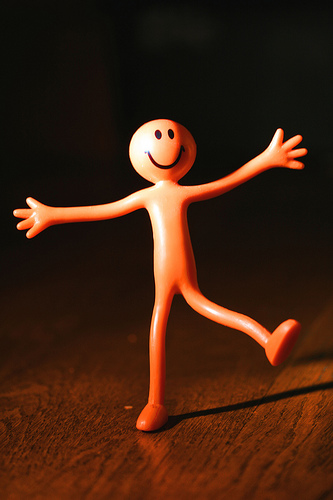Among my current reading material is The Art of Happiness: A Handbook for Living, in which Howard Cutler interviews the Dalai Lama on the subject of human happiness and comes away with some profound information to pass along.

Although ... there is such a thing as TOO happy.
For anyone who may be tempted to stop reading now on the idea that happiness isn’t important to studying how we successfully motivate ourselves, stick with me for a moment or two! (Anyway, it’s a short post.) In the same way that a discontented workforce gets much less done than a contented group of workers, a discontented mind has a much harder time staying on task than a content mind. There’s much more to say about happiness and its powerful effect on self-motivation, but we’ll leave that for other posts.
So if we do want to pursue happiness, whether for its own sake or to support stronger motivation and willpower, it’s important that we distinguish between happiness and pleasure. This is the distinction that the Dalai Lama makes in the book I mention above, and it’s both a meaningful and a practical distinction.
Pleasure is by definition a short-term thing. We can get pleasure from enjoying an activity, enjoying someone’s company, from food, from sex, from success, or from a wide variety of other sources. Happiness, by contrast, is a lasting state that most often is achieved through positive, constructive actions. While it’s not impossible for someone to feel genuinely happy about doing something destructive or cruel, this is the exception instead of the rule, and anyway we’re not saying that making ourselves happy is a flawless approach to living a compassionate or ethical or commendable life. What we can say is that constructive decisions tend to lead to greater happiness, and destructive decisions tend to lead to decreased happiness.
In terms of helping immediate motivation, we can harness this connection whenever we’re concerned that we’re not acting in accordance with our goals and priorities–that is, when our motivation is failing–by asking ourselves “Will this contribute to my happiness?” There are many things we might point to that can bring pleasure but not happiness (though thankfully, there are also many that bring both). By asking ourselves this question, we can put these actions in perspective so that we see what we’re doing to ourselves over a bit of a longer period of time. Having that clear view of how our choices affect our lives can be invaluable, because our worst choices are made when our judgment is clouded.
Photo by Niffty..


